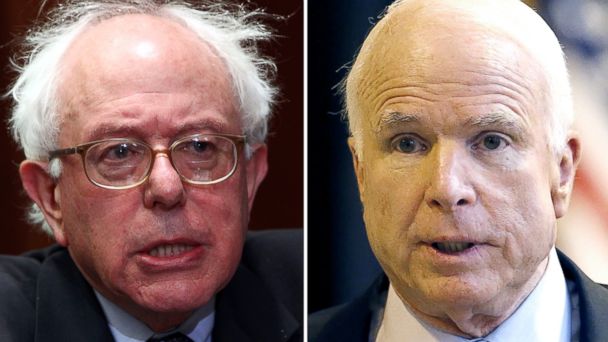McCain and Sanders Strike Bipartisan Agreement to Overhaul VA

(Win McNamee/Getty Images|Matt York/AP Photo)
Sens. Bernie Sanders and John McCain unveiled a bipartisan deal to overhaul veterans' health care and access to benefits in the wake of the recent scandal at Veterans Affairs.
"We have a crisis on our hands," Sanders, an independent from Vermont who is chairman of the Senate Veterans Affairs Committee, said on the Senate floor as he announced the deal. "It is imperative that we deal with that crisis."
The pact aims to fix the systemic issues that have drawn headlines in recent weeks on Capitol Hill, allocating $500 million to hire new doctors and nurses.
The proposal seeks to increase access to medical facilities, and addresses long wait times and medical treatment for military sexual assault victims. It also provides veterans and their families with financial assistance to pursue new education opportunities.
The deal also provides the VA secretary authority to demote or fire senior executive service employees based on performance, and allows for immediate firing of poor-performing employees. The legislation, however, creates an appeals process, although employees who face discipline are not eligible for pay during that period.
The House passed an alternative bill to expand authority for the VA secretary May 21. Sanders said he worked to gain the support of House Veterans Affairs Chairman Jeff Miller, R-Fla.
Both senators said that the bill is a compromise and not precisely how they would have drawn it up alone, but they hoped a bipartisan agreement will encourage their colleagues to put aside party divisions for the sake of veterans.
The legislation also includes a provision for a VA Choice Card, which entitles veterans who live more than 40 miles from a VA medical center or face long wait times to be able to choose a healthcare provider that meets their needs.
"The top priority for me for many years has been to give the veteran a choice," McCain, R-Ariz., said. "They should be able to go to the health care provider right near their home. Not have to get in a van and ride for two or three hours for routine medical care."
McCain added that the agreement weighs the diverse needs of the country's veterans, from those who served in World War II, the Vietnam War and the Korean War to more recent conflicts like Afghanistan and Iraq, where combat veterans face increasing needs.
Both senators discussed the importance of improving access to quality medical care for sexual assault victims in the military.
"Sexual assault is probably one of the most vexing issues that we face in the military today outside of combat," McCain said. "This is a problem in the military that needs to be addressed."
The agreement, which is now being crafted into legislation, also touches on issues outside of veteran health care fixes, providing financial assistance to veterans for in-state tuition to public colleges and universities. It also entitles Gold Star Wives, whose spouses were killed in combat, to take advantage of the GI bill tuition eligibility.
"We have heard from many young veterans who are in college as a result of the post-9/11 GI bill, can't afford to go to college because they're not getting in-state tuition," Sanders said.
"Let's focus on the needs of veterans," McCain added. "Let's not make them political footballs."